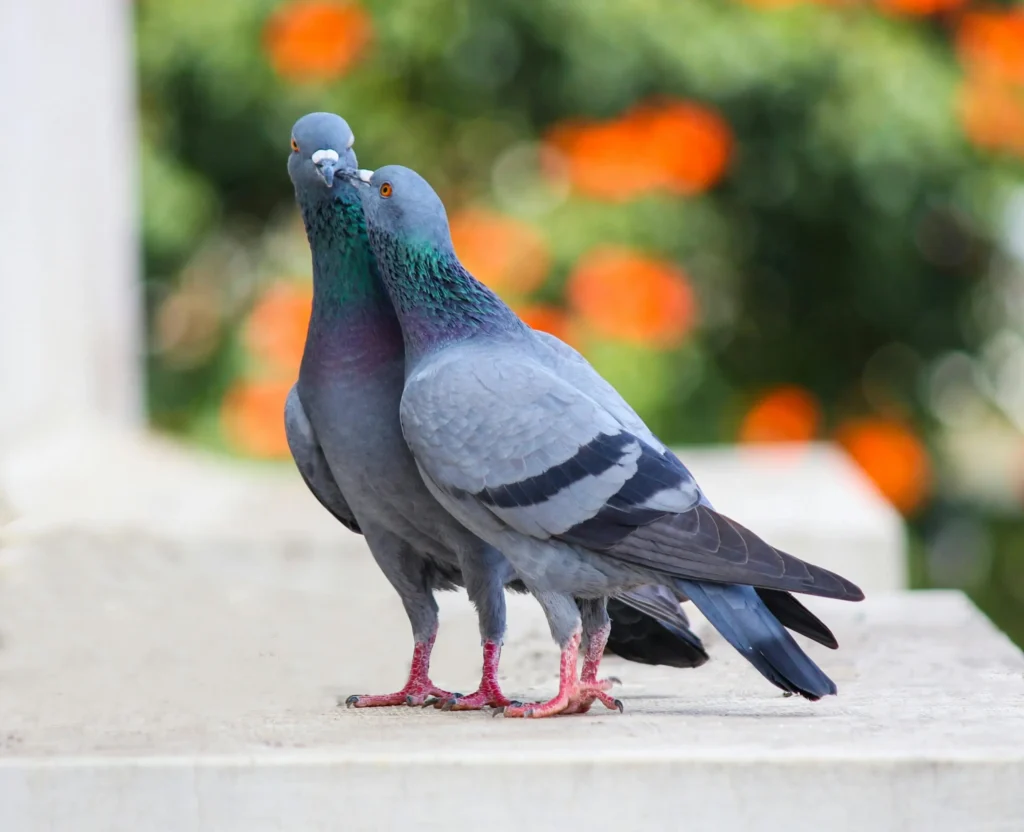
Interesting Wildlife Facts About Pigeons
- Pigeons, also known as rock doves, are one of the oldest domesticated bird species, with a history dating back thousands of years.
- They have remarkable navigation abilities, often using the Earth’s magnetic field, the position of the sun, visual landmarks, and even their sense of smell to find their way home.
- These birds are monogamous, often forming lifelong mating pairs.
- Pigeons can live for up to 15 years in captivity, though their lifespan is typically 3-5 years in urban areas due to predation, disease, and environmental hazards.
Nuisance Issues with Pigeons
Pigeons can become a significant nuisance when they congregate in large numbers on residential, commercial, or public properties:
- Droppings Accumulation: Pigeon feces are highly acidic, causing damage to buildings, vehicles, and monuments.
- Health Hazards: Their droppings can harbor diseases and create slippery surfaces, posing safety risks.
- Noise and Odors: Pigeons’ cooing sounds and nesting materials can be disruptive and unpleasant.
- Clogged Gutters: Nesting materials often block gutters and drainage systems, leading to water damage.
- Attraction of Other Pests: Pigeon activity can attract mites, fleas, and other pests to your property.
Pigeon Behavior
- Social Structure: Pigeons are highly social and often form large flocks in urban and suburban areas.
- Feeding Habits: They are opportunistic feeders, thriving on grains, seeds, and human food scraps.
- Roosting Preferences: Pigeons roost on flat, elevated surfaces like rooftops, ledges, and bridges.
- Breeding: Pigeons breed year-round, with females typically laying two eggs per clutch.
Pigeons and Diseases
- Histoplasmosis: A fungal disease that can develop in soil or dust enriched by pigeon droppings.
- Cryptococcosis: Another fungal infection linked to pigeon droppings, which can cause respiratory issues.
- Ectoparasites: Pigeons often carry mites and fleas, which can infest nearby areas or hosts.
Where in the US Are Pigeons Found?
Pigeons are found throughout the United States, especially in urban and suburban areas:
- Cities: Urban centers provide abundant food and nesting sites, making them ideal habitats for pigeons.
- Suburban Areas: Residential neighborhoods with bird feeders and gardens often attract pigeons.
- Rural Regions: Farms and grain storage facilities can support large pigeon populations, but pigeons are generally less common in rural areas compared to urban and suburban regions due to fewer nesting sites and consistent food sources.
- Coastal Areas: Pigeons thrive in port cities and other areas near water.
Protecting Your Property from Pigeons
To protect your property from pigeons, start by sealing entry points such as gaps in roofing, vents, and windows where they may gain access. Install bird netting or spike strips around ledges, eaves, and other roosting areas to prevent pigeons from nesting. Keep outdoor areas clean by removing food sources, such as open trash cans or food waste, which can attract pigeons. If you have a rooftop or outdoor space where pigeons frequent, consider using bird repellents or hiring a professional pest control service to implement long-term solutions. Regularly inspect your property for signs of pigeon activity and take action as needed.
